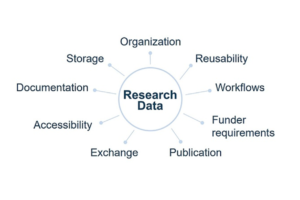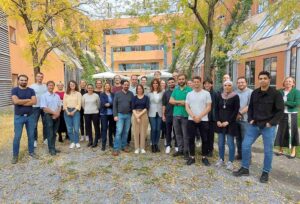Running Time: January 2020 to December 2022
Project Lead: TU Graz
The FAIR Data Austria project is designed to strengthen knowledge transfer between universities, industry, and society und supports the sustainable implementation of the European Open Science Cloud (EOSC). Within the project, implementation of the FAIR principles (which mandate that research data be Findable, Accessible, Interoperable, and Reusable) plays a major role. Observation of the FAIR principles is secured through 1) integrated data management aligned with generic and discipline-specific needs of researchers, 2) development of next-generation repositories for research data, code, and other research outputs, and 3) development of training and support services for efficient research data management. FAIR Data Austria thereby offers tools to complement the Austrian Data Lab and Services as well as RIS Synergy projects.
Supporting the entire data lifecycle – from data generation all the way to data archiving – with the appropriate tools and expertise is essential to achieve efficient research data management according to the FAIR principles, a process that can only be successful when supported by all Austrian HEIs. The FAIR Data Austria project therefore supports the collaboration of Austrian universities in developing coherent services for research data, thereby securing Austria’s position within the international research landscape.
NEWS

Online Workshop “RDM at Technical Universities: See How Others Do It!” on 24.11.2022
Researchers from TU Graz and TU Wien will report on their experiences with DMPs, the practical implementation of the FAIR principles, and the use of

FAIR Data Austria Project Meeting in Graz
At the invitation of Graz University of Technology, the FAIR Data Austria team met for a project meeting in Graz. After a brief review of

The webinar series “RDM in Austria” starts into the next season
The winter semester 2022/2023 will start with the workshop Becoming Part of EOSC: Learn How to Prepare Your Services on 18.10.2022, 10:00 – 12:30. This

Online Workshop “From Practice: Data Management at ZAMG ”
The last RDM in Austria webinar before the summer break gives an insight into the work of ZAMG, the Austrian institute for meteorology and geodynamics.

